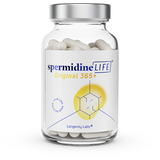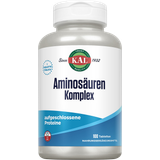Q & A about Cholesterol
Cholesterol is often seen as a bad guy by health experts. Is cholesterol really such a bad thing? Lately experts have been increasingly critical about the negative effects of cholesterol.
17.5 million people die annually from cardiovascular diseases. Cardiovascular diseases are the leading cause of death in Western industrialized countries. Cholesterol is often given the blame for these deaths.
Recently, however, critics have begun to question the prevailing wisdom about cholesterol. These critics do not see the correlation between the risk of cardiovascular disease and cholesterol. Here we have to look at two points of view:
The role of cholesterol in the body
Prevailing opinion: Without cholesterol a person cannot live. Cholesterol is a fat-like substance that strengthens cell membranes and contributes to the formation of hormones and other substances. It is mainly produced by the liver and therefore should not be present in large amounts in our diet.
Critics: Almost all of the body's cells can form cholesterol. The little cholesterol that is still needed, comes from our food or is formed by the liver. Those who suffer from a cholesterol deficiency could also develop neurological disorders, or might have a weakened immune system. A lack of cholesterol stems from genetic reasons.
Are there "good" and "bad" types of cholesterol?
Prevailing opinion: There are two types of cholesterol: good HDL and bad LDL cholesterol. If we have too much LDL cholesterol, it can lead to fatty deposits in our body and to arteriosclerosis. HDL cholesterol transports excess cholesterol back to the liver where it is excreted in the bile.
Critics: There is only one type of cholesterol that consists of the lipoproteins HDL and LDL. In tests, a high HDL levels was associated with a lower risk of cardiovascular disease. Often, however, the cause and effect of cardiovascular diseases are confused. No one knows, for example, why LDL levels rise. The problem is not the amount of LDL in our bodies, but a lack of exercise. Cholesterol is therefore a poor indicator of the state of the cardiovascular system.
Reasons for elevated cholesterol
Prevailing opinion: There are several factors that result in high cholesterol levels. In addition to genetic predisposition, age, sex, a high-fat diet, lack of exercise, smoking and dyslipidemia play a role.
Critics: A high cholesterol is not necessarily a symptom of a disease, but may indicate a disturbed lipoprotein metabolism. It is hard to define a "normal" metabolism, because every person is different and these values are not stable over the course of a day.
Do people with high cholesterol have an increased risk for heart attacks?
Prevailing opinion: The growing accumulation of excess LDL cholesterol leads to atherosclerosis. Other factors like diabetes and smoking influence LDL levels. The hardening of the arteries through cholesterol build up means that the coronary arteries become clogged, resulting in coronary heart disease, the leading cause of death in western industrial countries.
Critics: It has never been confirmed that a lower cholesterol level protects against cardiovascular disease. This is true only in exceptional cases. Cholesterol is innocent because heart attacks are caused by arteries being clogged by blood clots. The risk of LDL comes not from the concentration of LDL in the blood, but from oxidation. Smoking, lack of exercise and an unhealthy diet promote oxidation. Lower cholesterol levels do not prevent a heart attack. In some studies the beneficial effect antioxidants to stop oxidation processes in the body could not be confirmed.
What can affect cholesterol levels?
Prevailing opinion: Healthy eating and physical activity are the foundation for healthy cholesterol. In combination with weight loss, quitting smoking and reducing alcohol consumption, cholesterol levels can be reduced by about 15%.
Critics: Assuming that cholesterol is innocent, the levels themselves are not important. It is better to choose a lifestyle that promotes heart health that to worry about the cholesterol levels.
If you have a low fat diet, do you lower your risk of heart attacks?
Prevailing opinion: It depends on the fats you eat. Saturated fatty acids are considered causes of heart attacks. Therefore more unsaturated than saturated fatty acids should be consumed.
Critics: A high amount of saturated fat increases the levels of lipoproteins in the blood and also the cholesterol levels of the body. The ingestion of unsaturated fatty acids (especially omega-6) lowers the lipoprotein count. This, however, does not decrease the risk of heart attack. Some studies suggest that the consumption of omega-6 fatty acids actually increases your risk of cancer.
Note: The statements in this article are for informational purposes. They are not recommended treatment options and are not meant to replace advice from a doctor or professional.
Latest reviews
-
 4.6 (7)
4.6 (7)Nature Love Organic Grapefruit Extract, 50 ml
- Gentle cold extraction
- Made from grapefruit seeds & peels
- One bottle lasts for 3 weeks
€ 16,49 (€ 329,80 / l)Delivery by May 07
-
 4.3 (3)
4.3 (3)Ketofabrik Chocolate Coconut Bar, 1 bar
- 1g sugar per bar
- Reduced sugar alternative
- 3.6g net carbs per bar
€ 1,59Not available at the moment
-
 4.7 (11)
4.7 (11)Longevity Labs spermidineLIFE® Original 365+, 60 capsules
- Approved EU wide as a novel food
- From Austria
- No artificial dyes or flavours
€ 69,49Delivery by April 17
-
 € 39,99 (€ 285,64 / kg)
€ 39,99 (€ 285,64 / kg)Delivery by April 17
